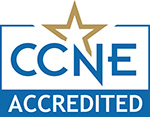Doctor of Nursing Practice (DNP) Online Degree Programs
Doctor of Nursing Practice
Our complex healthcare environment benefits from advanced knowledge and practice expertise, which can positively affect healthcare outcomes for individuals and populations. Colorado Technical University’s Doctor of Nursing Practice program is designed for licensed RNs with a Master’s in Nursing who are looking to continue on to the Doctorate level, which is the terminal degree for nursing. Demand for nurses with a Doctor of Nursing Practice degree continues to grow as employers are quickly recognizing the unique contributions that expert nurses are making in the practice arena, reports the AACN.1
1 American Association of Colleges of Nursing, June 2024 https://www.aacnnursing.org/news-data/fact-sheets/dnp-fact-sheet
This program is not a Nurse Practitioner program or a PhD and is designed for students with a current, active, and unencumbered RN license in the US. Applicants must also have a programmatically accredited Master of Science in Nursing degree from a regionally accredited institution

Program Overview
The Doctor of Nursing Practice (DNP) is a terminal degree for nurses who are interested in becoming a nursing practice expert. Applicants must hold a current, active and unencumbered license to practice as a Registered Nurse (RN) in the United States, as well as a programmatically accredited Master of Science in Nursing degree from a institutionally accredited institution.
The Doctor of Nursing Practice is designed to build on the skills, talents and educational groundwork of a Master of Science in Nursing program and helps students prepare for advanced nursing roles in systems leadership and administration, maximizing the application of evidence to improve healthcare outcomes. The program provides instruction in healthcare delivery systems, health economics and finance, health policy, research methods, translation of evidence into practice, concepts in population health, and nursing leadership.
This program does not lead to additional licensure or certification. As such, CTU has made no determination regarding prerequisites for licensure or certification in any state or jurisdiction.
College of Nursing Mission Statement:
Through an innovative curriculum and student- centered teaching, the nursing faculty teaches, supports, and inspires students to become competent, caring, and accountable professionals who serve a diverse client population within a dynamic health care environment.
Relevant Institutional/Programmatic Accreditation
CTU is institutionally accredited by the Higher Learning Commission www.hlcommission.org
The Doctor of Nursing Practice degree program at Colorado Technical University is accredited by the Commission on Collegiate Nursing Education, 655 K Street NW, Suite 750, Washington, DC 20001, 202-887-6791.
Estimate your costs, potential savings and graduation date
Courses
| Courses-Core | Credits | |
|---|---|---|
| NRSG810 | Scientific Underpinnings of Nursing Practice | 4 |
| NRSG812 | Applying Evidence-Based Practice and Research to Improve Health Outcomes | 4 |
| NRSG815 | Information Systems and Advanced Nursing Practice | 4 |
| NRSG817 | Health Policy and Advancing Nursing Practice | 4 |
| NRSG825 | Population Health and Epidemiology | 4 |
| NRSG830 | Organization and Systems Leadership | 4 |
| NRSG831 | DNP Project I: Design and Planning | 6 |
| NRSG832 | DNP Project II: Implementation of Evidence Based Practice | 6 |
| NRSG833 | DNP Project III: Evaluation of Change | 5 |
| DNP Specialty Topic I | 4 | |
| DNP Specialty Topics II | 4 | |
| Total Credit Hours: | 49 | |
| Students who have not completed the required 500 post-baccalaureate clinical hours must complete the DNP Transitions course/s prior to beginning their DNP Project courses. | Credits | |
|---|---|---|
| NRSG820 | DNP Practice Transitions I | |
| NRSG821 | DNP Practice Transitions II | |
| NRSG822 | DNP Practice Transitions III | |
| Total Credit Hours: | 13 | |
| Courses- DNP Specialty Topic Options | Credits | |
|---|---|---|
| HCML870 | Health Policy and Regulations | 4 |
| HCML872 | Economics and Financing of Healthcare Organizations | 4 |
| HCML874 | Continuous Improvement for Systems in Healthcare | 4 |
| HCML876 | Informatics in Healthcare | 4 |
| LDR870 | Self-Insight and Personal Development as a Leader | 4 |
| MGMT824 | Strategic Thinking and Organizational Alignment | 4 |
| ODC870 | Organizational Strategy & Design | 4 |
| ODC872 | Current Topics in Organizational Development | 4 |
| ODC874 | Leading and Managing Large Scale Transformation | 4 |
| ODC876 | System Thinking and Decision Making | 4 |
Total Credit Hours: 49
Learning Outcomes
- Incorporate scientific principles from nursing and other disciplines to improve practice.
- Appraise, synthesize and ethically apply evidence as an advanced practice nurse to complex health issues.
- Demonstrate systems leadership promoting professional collaboration to improve healthcare outcomes.
- Evaluate health issues of diverse populations to improve healthcare outcomes.
- Analyze, advocate and apply policy to improve practice and healthcare outcomes.
- Incorporate healthcare delivery models and strategies to improve quality healthcare delivery.
- Apply principles of information systems and technology to improve healthcare outcomes.
Faculty

Dr. Rose Nieves
University DeanDr. Rose Nieves is the Dean of the College of Nursing for Colorado Technical University. In this role, she leverages her vast experience as a nursing leader, educator and healthcare provider to help assess, mold, develop and direct the College of Nursing.

Dr. Phaedra Walker
Executive Program DirectorDr. Phaedra Walker is the Executive Program Director of Nursing and Health Studies at Colorado Technical University. Dr. Walker is a board-certified Advanced Practice Registered Nurse, Family Nurse Practitioner with more than 25 years of experience in the nursing profession.
For more faculty profiles please visit our Leadership and Faculty page.
For more information visit the College of Nursing.
Admission Requirements
Program Requirements
Admission to this program requires an active, clear, and unencumbered license to practice as a Registered Nurse (RN) in the United States. All students must maintain this licensure throughout the program of study.
Students must have graduated with a programmatically accredited Master of Science in Nursing (MSN) degree from an institutionally accredited institution. A minimum grade point average (CGPA) of 3.0 or higher on a 4.0 scale is required for acceptance into the program.
Prior to starting the nursing program all applicants must submit an unofficial or official copy of their college transcript from their MSN degree for review. Applicants to the Doctor of Nursing Practice (DNP) degree program who meet all general admission requirements, but did not successfully complete a graduate level statistics course, may be granted provisional admission, until the completion of a graduate level statistics course with a B- or higher. Provisionally accepted students who do not complete a graduate level statistics course prior to NRSG812 Applying Evidence-Based Practice and Research to Improve Health Outcomes will be administratively withdrawn. CTU offers HCM671 Healthcare Statistics that fulfills this program requirement. Students who do not have prior graduate level statistics should consult with their Student Success Coach about options to satisfy this requirement.
The DNP requires a minimum of 1,000 post-baccalaureate clinical hours. CTU may recognize up to 500 hours of supervised, documented clinical hours from your post-baccalaureate (MSN or Post Graduate Certificate) experience toward this clinical requirement.
Potential DNP students must have completed a minimum of 120 documented clinical hours at the post-baccalaureate level prior to admission to the DNP program. Students with 120 clinical hours or greater, but less than 500 clinical hours, will be scheduled for the DNP transitions course(s). This course can be taken at varying credit hours depending on clinical hours transferred into the DNP program. Verification of post-baccalaureate clinical hours completed in the MSN or Post Graduate Certificate program must be submitted on the Colorado Technical University Attestation of Supervised Clinical/Practice/Practicum form.
Doctor of Nursing Practice (DNP) students are required to attend a symposium event two times during their enrollment in the program. Additional information about CTU's doctoral symposium can be located in the Doctoral Symposium section of this catalog.
At this time, Colorado Technical University cannot accept inquiries for the DNP program from residents of the states of Alabama, Alaska, Delaware, Louisiana, Massachusetts, Minnesota, New Hampshire, New York, Tennessee, Washington, and West Virginia.
Related Degrees
Compare up to three additional degrees
FAQs
CTU’s nursing students use intellipath® adaptive learning technology, comparable to the computerized adaptive testing nurses use to enter the profession, focus on new knowledge development, and skip the content they already know. We infuse our faculty-led nursing courses with intellipath® assignments, writing assignments, discussion boards, virtual simulations, clinical experiences and journaling, among others.
Our students also experience interdisciplinary collaboration in clinical courses without worrying about participating in group project assignments. They also complete clinical experiences and a mix of traditional assignments.
No—The Doctor of Nursing Practice is not an advanced practice nursing program. The DNP program leads to a terminal degree that provides advanced nursing education in systems leadership and application of evidence-based practice to improve healthcare outcomes. It does not lead to a change in the scope of practice.
The DNP program is designed to allow the working nurse to advance in his or her DNP degree while continuing to work within the community. With an asynchronous (any time of day) classroom format, this allows students to formulate a study schedule that can be incorporated into their professional life. Instructors also provide synchronous chats to support varied adult learning needs.
The Clinical Coordinator will work with each student to identify a preceptor for the DNP practicum. Students may identify and submit a preceptor for review and approval if appropriate and in alignment with the structured doctoral project. Student engagement in the process is vital to securing a practicum placement that meets programmatic requirements and is fulfilling for the student.
Students must disclose if they are requesting to do their practicum within their current place of employment or health system. Students may not complete practicum hours in their current departments or with in-line supervisors. Students are required to complete a minimum of 500 clinical hours at CTU. The number of hours will vary depending on how many clinical hours the student completed in their MSN program. In addition to successful completion of all courses, all DNP graduates must have completed a total of 1000 post-baccalaureate hours to graduate from the DNP program.
Information about the DNP Project can be found in the DNP Handbook which is in the Nursing Learning Center. Course faculty, the DNP Project Team, and the Clinical Coordinator are available for support.
